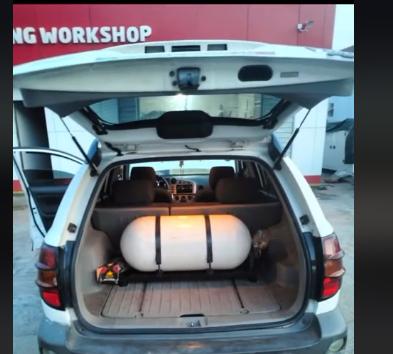By Michael Chibuzo
The administration of President Bola Ahmed Tinubu has intensified efforts to wean Nigeria off near total reliance on PMS as transportation fuel following the hike in pump price of PMS that accompanied the fuel subsidy removal on May, 29th 2023. As part of measures to cushion the effects of the subsidy removal, President Bola Ahmed Tinubu had in a national broadcast on July 31st announced plans by the Federal Government to procure 3000 CNG-powered buses to aide mass transit across the country.
Some observers raised concerns about the issue of refilling of the compressed natural gas cylinders considering there are inadequate number of CNG filling stations currently across the country. However, President Bola Tinubu was already planning ahead and set in motion efforts to upscale the number of CNG filling stations across the country in phases. The NNPC Limited then signed a partnership agreement with a market leader in CNG retail in Nigeria, NIPCO to establish 56 CNG Stations nationwide and three mother CNG stations in two phases.
While shedding more light on the wider CNG policy in a chat with journalists on TVC’s Journalist Hangout, the Official Spokesperson of the President, Chief Ajuri Ngelale pointed out that based on the urgency from the president, the first phase will run between now and March 31, 2024 – a period of eight (8) months. Within this 8 months, 21 new CNG Stations will be rolled out spread across the six geopolitical zones. These 21 CNG filling Stations will be in addition to the 14 CNG filling stations that NIPCO is already operating.
The second phase which will start immediately on April 1st, 2024 will see the construction of 35 new CNG filling stations across the country by NIPCO in partnership with NNPC Limited. Also, NNPC Ltd will establish 56 CNG filling outlets in its already existing fuel station nationwide between now and 2024. This will bring the number of CNG retail stations in Nigeria to around 130. Other players are expected to enter the market.
President Tinubu’s CNG plan does not end there. The president is also working to encourage owners of cars, buses, tricycles (Keke) and trucks with petrol engines to install CNG conversion kits in their vehicles to enable their vehicles run on CNG, which is far cheaper and cleaner than PMS. President Tinubu understands that the key to reducing the effects of fuel subsidy removal on cost of transportation is to transition to cheaper alternative fuels. CNG is the perfect option for Nigeria.
Part of the Autogas policy of the Tinubu administration includes removing any potential bottlenecks to the setting up of CNG kit Workshops and procurement of CNG kits, which are likely to be imported in the interim as well as ensuring the retrofitting of petrol engines to CNG is reasonably affordable for vehicle owners. Chief Ajuri Ngelale also mentioned in his media chat that the federal government has made imported CNG kits duty free as parts of efforts to reduce the cost of these conversion kits to vehicle owners. He also stated that the federal government is working with state governments to ensure a one-stop shop is created for all approvals and certification these kit conversion workshops would require to set up in order to save time.
The CNG revolution in Nigeria is going to be a game changer because with increase in PMS prices to above N500 per liter, a switch to CNG is the absolutely necessary because a litre of CNG is now three times cheaper than PMS but still runs equivalent distance as PMS. For example, 10 liters of compressed natural gas (CNG) can run a vehicle for a distance equivalent to about 8-9 liters of premium motor spirit (PMS). Adopting CNG as main vehicle fuel has the capacity to improve the quality of life for our people, reduce cost of transportation and by extension cost of food, create jobs, with many industrial off-spin such as local production of factory-fitted CNG vehicles, CNG kits and spare parts.
This policy will also expand the CNG market in Nigeria. We have natural gas in abundance and it should be the number one fuel of choice. It requires little processing compared to crude oil. Many countries are transitioning to these cleaner fuels and Nigeria as gas nation cannot afford to be left behind. Exciting times are really ahead for Nigerians if we take advantage of the opportunities provided by the removal of fuel subsidy to deepen the gas revolution in Nigeria.

